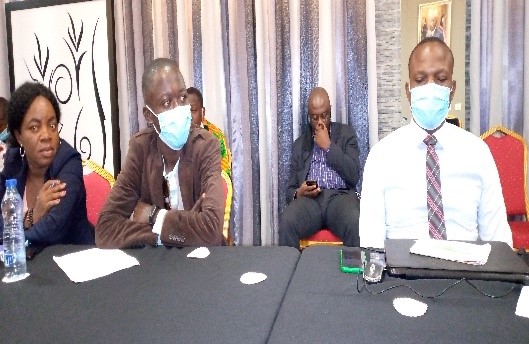PHOTO: Some participants at a media roundtable
By Mark N. Mengonfia -mmenginfia@gmail.com
Calls are being made for the Liberian government to ensure that the media in the country remain alive to serve the purpose for which they exist.
The calls came at a one-day media roundtable discussion organized by the Press Union of Liberia and the Carter Center Liberia.
Speaking at the event, Othello B. Garblah, President of the Publishers Association of Liberia (PAL), said the independent media as a business does not operate in a vacuum adding, “It relies on the economy in order to attract, maintain and increase advertisements for its survivability.”
According to him, with a devastating economy such as the one we have in Liberia coupled with poor readership and dwindling circulations, the media is unable to recruit, retain and pay professional staff.
He also highlighted the presence of the COVID-19 continue to have an impact on media institutions leaving many of the institutions to a near collapse. With more vigor in his tone, Garblah said: “Added to this, is the direction of needed advertisement to the Executive Mansions website, the President of the Republic of Liberia website.”
He went on to say: “With an appalling economic environment, the media is left alone to survive, which is one of the key reasons why professional journalism is being relegated, giving way to mediocrity and patronage.”
This time with an appealing voice, the head of the Publishers said, “But the truth of the matter is the media in Liberia need serious help. They lack the operational capacity to provide the kind of services the public needs.”
According to Liberian Publishers Association President, a soft grant from international partners would go a long way in strengthening the media independence to enable play its critical role in the Liberian democratic dispensation.
For her part, the president of the Reporters Association of Liberia, Madam Cecelia G. Clarke said for Carter Center Liberia to think of gathering media executives to discuss the state of the Liberia media, she thinks the institution is looking in the direction of the media with some help that will eventually change the narratives from what she called ‘state of backwardness.’
She stressed the need for subsidy from the Liberian government for operations setting an example with the Norwegian government that provided subsidy of NOK 303 million which was paid to 138 newspapers.
She pleaded with national and international partners who will lobby for funding in the name of helping the media to ensure that whatever they get have a direct impact on the media and not just training or workshops.
According to her, what journalists need now at this pressing time is resources to help them balance, not just training and workshops.
“Do not get me wrong anyway, I am not saying training is bad, but if there are no means to put into use the training, it is worthless, useless” the RAL boss stressed.
She furthered, “It is now time for donor partners to empower the media.”
The roundtable gather was brought together media executives to include Journalist Aaron Kollie of SKY FM and TV, Estelle Liberty Kemoh, director general at the Liberia Broadcasting System, Peter Quaqua, President of the West African Journalist Association, authorities of the Reporters Association, Female Journalist Association, and the Publishers Association Liberia.
In a remarks, WAJA president, Peter Quaqua said stressed the need for the Liberian government to advertise with the Liberian media as it is the only way for the industry to survive.
He also encouraged the government to remove the too many stumbling blocks placed in the ways of procuring ads from government institutions.
The WAJA President, playing a twin mother role at the gathering, told the publishers to make sure that those who work for them (Reporters) are paid.
He said because most media institutions are not paying their reporters lots of good journalist are leaving active journalism and turning into public relation officers.

